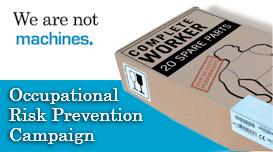Organization and Management of Occupational Risk Prevention
6. Improving the System
We shall now describe the techniques that allow us to suitably monitor the Risk Prevention Plan so as to be able to detect and correct any deficiencies and to identify possibilities for improvement, all in the pursuit of continuously improving the implanted system.
6.1. Health and Safety Inspections
These comprise systematic visits to sites, stores and offices that are carried out to detect unsafe actions or hazardous conditions that may affect the Health and Safety of workers.
6.2. Accident/Incident investigation
This consists in an analysis of the causes that lead to the accident/incident, together with preventive actions to avoid its repetition.
6.3. Investigation of work-related diseases
We denote as work-related diseases those diseases that, being typified or not as occupational diseases by current legislation, have been contracted by workers at work or as a result of their job. Diseases of this kind might be stress, moral harassment, legionellosis, etc. The detection of some of these diseases shall be carried out via the planned monitoring of the health of staff.
The actions to carry out resulting from said detection shall be recommended by the External Risk Prevention Service hired for the Medicine at Work speciality.
6.4. Statistics
This tool allows us to analyse the evolution of the accident rate in our companies. It provides knowledge of accident characteristics, thus allowing us to extract useful information with which to establish a series of corrective actions to reduce accident rates.
These statistics are used in the monthly and annual Risk Prevention Reports, as well as in the annual Planning, in Reviews of the System by Management, etc.
6.5. System audits
In-house audits: these are reviews of fulfilment of regulations and of their appropriateness. They are carried out just like other Integrated Management System audits.
External audits: these are reviews of the fulfilment of an adopted standard and of its appropriateness carried out by an external body to the Organisation.
Mandatory audits: these are the external audits which our Risk Prevention System must undergo in accordance with the legislation in force.
6.6. Continuous improvement
Besides the Health and Safety Committee in the different companies, there also exist Continuous Improvement Groups which address, among other topics, issues relating to improvements in Occupational Risk Prevention matters. In this way, Occupational Risk Prevention Management is incorporated in the ISASTUR Group’s Continuous Improvement System, periodically reviewing established goals and using in-house and external audits as a means to evolve in this respect.




